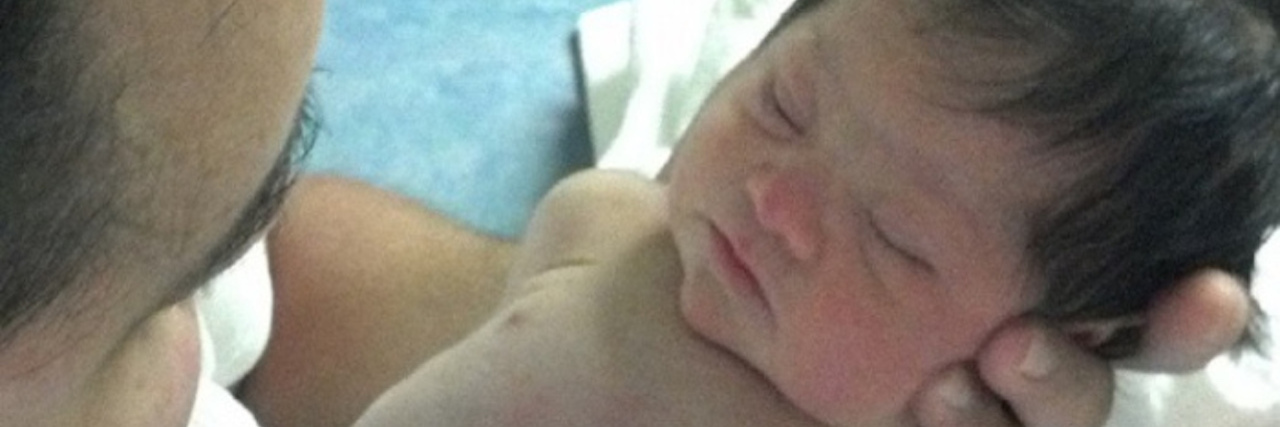When Ava was born, she made her way into the world via an emergency C-section. Her heart rate was dropping with each contraction I experienced and I remember fighting off panic as I forced myself to sit entirely still for the epidural. I needed to be prompted to breathe as I listened for the sounds of crying while my doctor snipped and pulled at my stomach. Finally, I heard newborn cries and I cried aloud, too. Ava was here, and she was safe. To me, she was absolutely perfect. I didn’t realize in the midst of all that emotion that the doctors and nurses were exchanging glances with each other as they whisked Ava away for a newborn check-up.
Ava’s dad went with her while she was examined. When he came back with her, I was finally allowed to hold her. I supported her head and bottom with my hands so I could stare at her little face. I loved the way Ava’s little tongue constantly peeped out from between her sweet lips. Her eyes were swollen, but they had a beautifully slanted shape to them. I also noticed that Ava’s arms hung loosely down at her sides. She didn’t seem to have the strength to keep her limbs tucked in at her sides on her own.
It didn’t dawn on me that this was an issue. Being new parents, we were armed with all different colors and styles of swaddling blankets. Keeping Ava swaddled snuggly was an instant remedy for her dangly limbs. We assumed this was typical of newborns and didn’t worry about it. If I was worried about anything, it was all the pain I was in from the C-section, so I was caught completely off-guard when a hospital pediatrician came into our room and shut the door, “We need to talk about your baby . . .”
In hushed tones, the pediatrician stated that she felt Ava might have Down syndrome. She explained to us that Ava had low muscle tone throughout her body, called hypotonia. This is why Ava’s arms hung loosely from her body. Ava’s jaw and tongue showed signs of low tone as well. Ava’s cute, peeping tongue was labeled a ”tongue thrust” and was not typical for babies born without Down syndrome.
She went on to explain that many children with Down syndrome are born with heart defects, so they had scanned Ava’s heart as a precaution. The results showed that Ava did, in fact, have two holes in her heart. My own heart couldn’t take this news and I began having trouble processing the rest of the doctor’s words. She was talking about Ava’s facial features having the characteristics of Down syndrome. She rattled off something about her eyes and a flat nose. I couldn’t make sense of the flat nose comment, but I let that go and pressed her about the holes in Ava’s heart. I cried as I asked her if Ava would survive her heart defect. She explained that Ava would need surgery, sooner rather than later, but she would most likely survive.
I then bombarded her with questions about the low-tone: “Can Ava overcome it? Would Ava be able to move her arms? Would she be able to life her head? Would she be able to speak due to the tongue thrust?”
All the pediatrician’s answers related to muscle tone were the same, “Almost all children with Down syndrome are born with low tone. No amount of exercise will make it go away, unfortunately.” I was devastated.
The pediatrician apologized before letting herself out of the room. That’s when the isolation kicked in. In other rooms, new mothers were enjoying their babies — babies without holes in their heart, babies without low tone, babies without Down syndrome. I had never felt more alone. The baby we had been dreaming of seemed to be gone. I had no idea what kind of future the baby in my arms was going to have. I held her close and sobbed. I sobbed for her plight and for my loss. I sobbed because I didn’t know what else to do.
I put my hand to Ava’s chest and tried to feel something irregular in her heartbeats, as if I could feel the holes in her heart. I only felt a firm, steady beat that calmed me. I tried to see the flat nose the pediatrician had mentioned, but I couldn’t see it. I only saw a beautiful face. I also didn’t see a tongue thrust — I saw a peeping tongue. I unswaddled Ava from her blankets and her arms gracefully fell back, opening up, not unlike wings. I let her arms hang down and I told her, “I don’t see low tone; I see angel wings.”
I had decided to take back the labels placed on Ava. I went online and searched for pictures and videos of children with Down syndrome. I found images of adorable children who were happy and loved. I read articles about people with Down syndrome breaking down barriers. I located online support groups. I learned about Down syndrome from the people who had first-hand experience. Mostly, I learned about Down syndrome from Ava. I have become a proud advocate of Down syndrome awareness because of our experience. Our introduction to Down syndrome was shameful and no parent should ever have to go through that.
Ava is 6 years old now and she is strong and smart. She loves to zipline — which requires a lot of upper body strength. She can walk, she can talk and she is potty-trained. She can do all these things while still having low tone and is now working towards academic goals.
Follow this journey at Ava’s Angel Wings.

